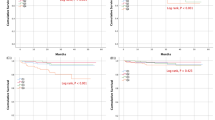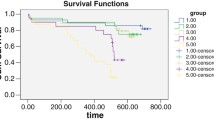Abstract
Atherosclerosis induces the elevation of uric acid (UA), and an elevated UA level is well known to lead to a poor prognosis in patients with acute heart failure (AHF). However, the prognostic value of atherosclerotic risk factors in hyperuricemic AHF patients remains to be elucidated. The data from 928 patients who were admitted to the intensive care unit (ICU) at Nippon Medical School Chiba Hokusoh Hospital between January 2001 and December 2014, and whose serum UA levels were measured were screened. A total of 394 AHF patients with hyperuricemia were enrolled in this study. The patients were assigned to a low-risk group (≤1 atherosclerosis risk factor) and a high-risk group (≥2 atherosclerosis risk factors) according to their number of risk factors. The patients in the low-risk group were more likely to have dilated cardiomyopathy, clinical scenario 3 than those in the high-risk group. The serum total bilirubin, blood urea nitrogen, C-reactive protein, and brain-type natriuretic peptide levels were significantly higher in the low-risk group than the high-risk group (p < 0.001, p = 0.005, p = 0.003, and p = 0.008, respectively). A multivariate Cox regression model revealed that the number of risk factors (number = 1, HR (hazard ratio) 0.243, 95 % CI 0.096–0.618, p = 0.003; number = 2, HR 0.253, 95 % CI 0.108–0.593, p = 0.002; number ≥3, HR 0.209, 95 % CI 0.093–0.472, p < 0.001), eGFR (per 1.0 mmol/l increase) (HR 0.977, 95 % CI 0.961–0.994, p = 0.007), and serum UA level (per 1 mg/dl increase) (HR 1.270, 95 % CI 1.123–1.435, p < 0.001) was an independent predictor of 1-year mortality. The prognosis, including all-cause death and HF events, was significantly poorer among the low-risk patients than among the high-risk patients. Atherosclerotic risk factors were not associated with a poor prognosis in patients with hyperuricemic AHF.




Similar content being viewed by others
References
Grayson PC, Kim SY, LaValley M, Choi HK (2011) Hyperuricemia and incident hypertension: a systematic review and meta-analysis. Arthritis Care Res (Hoboken) 63:102–110
Lv Q, Meng XF, He FF, Chen S, Su H, Xiong J, Gao P, Tian XJ, Liu JS, Zhu ZH, Huang K, Zhang C (2013) High serum uric acid and increased risk of type 2 diabetes: a systemic review and meta-analysis of prospective cohort studies. PLoS One 8:e56864
Billiet L, Doaty S, Katz JD, Velasquez MT (2014) Review of hyperuricemia as new marker for metabolic syndrome. ISRN Rheumatol 2014:852954
Huang H, Huang B, Li Y, Huang Y, Li J, Yao H, Jing X, Chen J, Wang J (2014) Uric acid and risk of heart failure: a systematic review and meta-analysis. Eur J Heart Fail 16:15–24
Anker SD, Doehner W, Rauchhaus M, Sharma R, Francis D, Knosalla C, Davos CH, Cicoira M, Shamim W, Kemp M, Segal R, Osterziel KJ, Leyva F, Hetzer R, Ponikowski P, Coats AJ (2003) Uric acid and survival in chronic heart failure: validation and application in metabolic, functional, and hemodynamic staging. Circulation 107:1991–1997
Huang WM, Hsu PF, Cheng HM, Lu DY, Cheng YL, Guo CY, Sung SH, Yu WC, Chen CH (2016) Determinants and prognostic impact of hyperuricemia in hospitalization for acute heart failure. Circ J 80:404–410
Tamariz L, Harzand A, Palacio A, Verma S, Jones J, Hare J (2011) Uric acid as a predictor of all-cause mortality in heart failure: a meta-analysis. Congest Heart Fail 17:25–30
Okazaki H, Shirakabe A, Kobayashi N, Hata N, Shinada T, Matsushita M, Yamamoto Y, Shibuya J, Shiomura R, Nishigoori S, Asai K, Shimizu W (2016) The prognostic impact of uric acid in patients with severely decompensated acute heart failure. J Cardiol. doi:10.1016/j.jjcc.2016.04.013
Gheorghiade M, Zannad F, Sopko G, Klein L, Pina IL, Konstam MA, Massie BM, Roland E, Targum S, Collins SP, Filippatos G, Tavazzi L (2005) Acute heart failure syndromes: current state and framework for future research. Circulation 112:3958–3968
Nieminen MS, Harjola VP (2005) Definition and epidemiology of acute heart failure syndromes. Am J Cardiol 96:5g–10g
McMurray JJ, Adamopoulos S, Anker SD, Auricchio A, Bohm M, Dickstein K, Falk V, Filippatos G, Fonseca C, Gomez-Sanchez MA, Jaarsma T, Kober L, Lip GY, Maggioni AP, Parkhomenko A, Pieske BM, Popescu BA, Ronnevik PK, Rutten FH, Schwitter J, Seferovic P, Stepinska J, Trindade PT, Voors AA, Zannad F, Zeiher A (2012) ESC Guidelines for the diagnosis and treatment of acute and chronic heart failure 2012: the Task Force for the Diagnosis and Treatment of Acute and Chronic Heart Failure 2012 of the European Society of Cardiology. Developed in collaboration with the Heart Failure Association (HFA) of the ESC. Eur Heart J 33:1787–1847
Yamanaka H, Metabolism TG (2012) Essence of the revised guideline for the management of hyperuricemia and gout. Japan Med Assoc J 55:324–329
Teramoto T, Sasaki J, Ueshima H, Egusa G, Kinoshita M, Shimamoto K, Daida H, Biro S, Hirobe K, Funahashi T, Yokote K, Yokode M, Japan Atherosclerosis Society Committee for E, Clinical Management of A (2007) Diagnostic criteria for dyslipidemia. Executive summary of Japan Atherosclerosis Society (JAS) guideline for diagnosis and prevention of atherosclerotic cardiovascular diseases for Japanese. J Atheroscler Thromb 14:155–158
Mebazaa A, Gheorghiade M, Pina IL, Harjola VP, Hollenberg SM, Follath F, Rhodes A, Plaisance P, Roland E, Nieminen M, Komajda M, Parkhomenko A, Masip J, Zannad F, Filippatos G (2008) Practical recommendations for prehospital and early in-hospital management of patients presenting with acute heart failure syndromes. Crit Care Med 36:S129–139
Iseki K (2008) Chronic kidney disease in Japan. Intern Med 47:681–689
Hamaguchi S, Furumoto T, Tsuchihashi-Makaya M, Goto K, Goto D, Yokota T, Kinugawa S, Yokoshiki H, Takeshita A, Tsutsui H, Investigators JC (2011) Hyperuricemia predicts adverse outcomes in patients with heart failure. Int J Cardiol 151:143–147
Mandviwala T, Khalid U, Deswal A (2016) Obesity and cardiovascular disease: a risk factor or a risk marker? Curr Atheroscler Rep 18:21
Kaul S, Alladi S, Mridula RK, Bandaru SV, Boddu DB, Anjanikumar D, Umamashesh M (2015) Prevalence and risk factors of carotid intima-media thickness in asymptomatic individual subjects in a tertiary care center in India. Ann Indian Acad Neurol 18:430–434
Wilson PW, D’Agostino RB, Levy D, Belanger AM, Silbershatz H, Kannel WB (1998) Prediction of coronary heart disease using risk factor categories. Circulation 97:1837–1847
Kondo T, Yamada T, Morita T, Furukawa Y, Tamaki S, Iwasaki Y, Kawasaki M, Kikuchi A, Kawai T, Takahashi S, Ishimi M, Hakui H, Ozaki T, Sato Y, Seo M, Sakata Y, Fukunami M (2016) The CHADS2 score predicts ischemic stroke in chronic heart failure patients without atrial fibrillation: comparison to other stroke risk scores. Heart Vessels. doi:10.1007/s00380-016-0861-7
Hanatani A, Shibata A, Kitada R, Iwata S, Matsumura Y, Doi A, Sugioka K, Takagi M, Yoshiyama M (2016) Administration of tolvaptan with reduction of loop diuretics ameliorates congestion with improving renal dysfunction in patients with congestive heart failure and renal dysfunction. Heart Vessels. doi:10.1007/s00380-016-0872-4
Shirakabe A, Hata N, Kobayashi N, Okazaki H, Shinada T, Tomita K, Yamamoto M, Tsurumi M, Matsushita M, Yamamoto Y, Yokoyama S, Asai K, Shimizu W (2015) Serum heart-type fatty acid-binding protein level can be used to detect acute kidney injury on admission and predict an adverse outcome in patients with acute heart failure. Circ J 79:119–128
Shirakabe A, Hata N, Kobayashi N, Shinada T, Tomita K, Tsurumi M, Matsushita M, Okazaki H, Yamamoto Y, Yokoyama S, Asai K, Mizuno K (2013) Prognostic impact of acute kidney injury in patients with acute decompensated heart failure. Circ J 77:687–696
Schrier RW (2006) Role of diminished renal function in cardiovascular mortality: marker or pathogenetic factor? J Am Coll Cardiol 47:1–8
Schrier RW, Abraham WT (1999) Hormones and hemodynamics in heart failure. N Engl J Med 341:577–585
Aronson D, Mittleman MA, Burger AJ (2004) Elevated blood urea nitrogen level as a predictor of mortality in patients admitted for decompensated heart failure. Am J Med 116:466–473
Acknowledgments
We are grateful to the staff of the ICU and the medical records office at Nippon Medical School Chiba Hokusoh Hospital for collecting the medical data.
Author information
Authors and Affiliations
Corresponding author
Ethics declarations
Funding
This research received no Grants from any funding agency in the public, commercial, or not-for-profit sectors.
Conflict of interest
The authors declare no conflicts of interest in association with this study.
Rights and permissions
About this article
Cite this article
Okazaki, H., Shirakabe, A., Kobayashi, N. et al. Are atherosclerotic risk factors associated with a poor prognosis in patients with hyperuricemic acute heart failure? The evaluation of the causal dependence of acute heart failure and hyperuricemia. Heart Vessels 32, 436–445 (2017). https://doi.org/10.1007/s00380-016-0893-z
Received:
Accepted:
Published:
Issue Date:
DOI: https://doi.org/10.1007/s00380-016-0893-z




